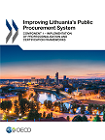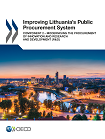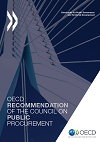Public Procurement Reform in Lithuania
Support for the Improvement of the Lithuanian Public Procurement System through professionalisation of the national workforce and streamlining of R&D tendering
Lithuania, an EU member state and the most recent member country of the OECD, has been actively implementing public sector and public procurement reforms to achieve sustainable and inclusive growth while ensuring an efficient utilisation of public funds. In 2015, public procurement accounted for 30.4% of the total government expenditures and 10.7% of the GDP in Lithuania, almost the same level of the OECD averages (29.1% and 11.9%, respectively).
Regardless of its relatively sound procurement system, Lithuania still faced additional challenges. First, the capacity building system of the public procurement workforce was fragmented without any professionalisation strategy and certification framework. Another challenge faced by Lithuania was the insufficient use of public procurement to increase innovation, related to the lack of adequate competences, but also to the possible inadequacy of the current six procurement schemes of innovation and R&D.
To reap the benefits of recognizing these challenges, Lithuania requested support from the Structural Reform Support Service (SRSS) of the European Commission. The European Commission agreed to provide technical support to Lithuania via financial support to the OECD, in order to assist Lithuania in improving its public procurement system by:
1. Establishing a professionalisation strategy and certification framework for the public procurement workforce
2. Streamlining the existing six schemes and mechanisms related to the public procurement of innovation and R&D services
Fast Facts
 |
Country: Lithuania |
 |
Timeframe: March 2018 – March 2019 |
 |
Counterparts:
|
 |
Areas of focus: |
List of Deliverables
- Assessment of the capacity of the national public procurement workforce to identify challenges and training priorities
- Development of certification framework which consists of two levels (60-hour training courses in total)
- Development of professionalisation strategy
- Development of training materials for 14 courses (31-hour courses out of the total 60 hours required in the certification framework) and examinations in English and Lithuanian
- “Training of trainers” workshops (5 days) and pilot sessions (4 days) for 14 procurement courses to train 29 future trainers of the training courses in the certification framework
- Assessment of the current six existing schemes/programmes related to public procurement for R&D services in order to modernise the procurement system of innovation and R&D
Timeline
- 19-20 March 2018: Kick off meeting
- 27 July 2018: Presentation of the two draft reports (professionalisation and certification framework / modernizing the procurement of innovation and R&D)
- 4-9 November 2018: “Training of trainers” workshops
- 7-11 January 2019: Pilot sessions for future trainers with trainees coming from different contracting authorities
- 13 March 2019: Closing event with the presence of the EU SRSS to discuss the main findings and recommendations with a wide group of interested national stakeholders. Presentation of the next steps and actions to address them by the Lithuanian authorities.
Content of the project
The project was comprised of the following two components:
- Component I: Evaluation of training needs, definition of training priorities and the development of training programmes
This component consists in establishing a professionalisation strategy and certification framework for the public procurement workforce in Lithuania.
As a starting point of this component, the OECD assessed the capacity and challenges of the public procurement workforce in order to define the training priorities: market analysis, technical specifications, award criteria, integrity and conflict of interest in public procurement, and strategic procurement (green procurement, SME development, innovation, and social responsibility). Built upon this assessment, the OECD designed a certification framework customized to the public procurement workforce in Lithuania, which consists of two levels: Basic and Advanced (in total, 60 hours of course requirement).
Then, the OECD developed training materials and examinations for 14 training courses that cover the procurement topics identified as training priorities. The OECD organised 5-day “Training of trainers” workshops and 4-day pilot sessions to train 29 future trainers of the training courses set out in the certification framework.
The OECD also proposed professionalisation strategy tools to assist Lithuania in advancing the agenda of professionalisation of the public procurement workforce. These tools included methodological assistance, degree/internship program, community of practice, and one-stop shop procurement portal.
- Component II: Development and implementation of the integrated system of public procurement of R&D services.
This component consists in streamline the existing six schemes and mechanisms related to the public procurement of innovation and R&D services. The OECD analysed all the six existing schemes and mechanisms related to the public procurement of R&D services in order to recommend the proposals which contribute to modernising and streamlining the current mechanisms:
- National R&D Programmes (former National Science Programmes)
- Long-term institutional R&D programmes
- Pre-commercial Procurement scheme
- Innovative Public Procurement scheme
- Ministerial Orders for R&D services (Scheme for research and higher education institutions to purchase R&D services)
- Urgent and Required Research and Technology Orders (Need-based R&D Projects)


